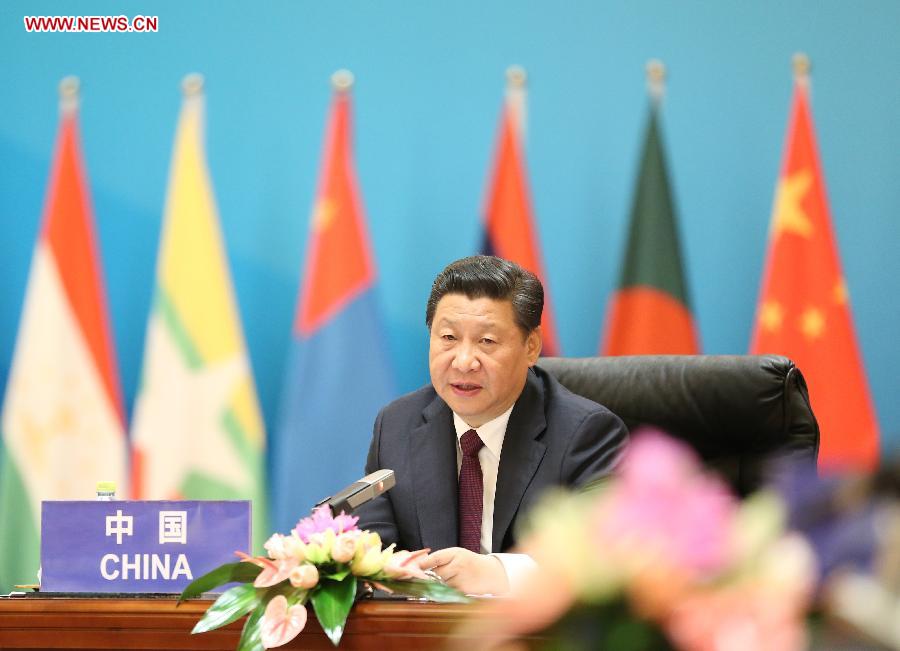 |
| Chinese President Xi Jinping presides over a Dialogue on Strengthening Connectivity Partnership in Beijing, capital of China, Nov.8,2014. (Xinhua/Ding Lin) |
BEIJING, Nov. 8 -- President Xi Jinping on Saturday said China will contribute 40 billion U.S. dollars to set up a Silk Road Fund at a dialogue meeting on strengthening connectivity and improving cooperation in the country's neighborhood.
Xi made the pledge when making a five-point proposal aimed at promoting interconnected development in the Asia-Pacific region as he met with leaders of Bangladesh, Cambodia, Laos, Mongolia, Myanmar, Pakistan and Tajikistan.
Also attending the meeting were representatives of the United Nations Economic and Social Commission for Asia and the Pacific and the Shanghai Cooperation Organization.
The new Silk Road Fund will be used to provide investment and financing support to carry out infrastructure, resources, industrial cooperation, financial cooperation and other projects related to connectivity for countries along the "Belt and Road", Xi said, referring to China's Silk Road Economic Belt and the 21st Century Maritime Silk Road initiatives.
He added that the fund will be "open" to active participation by investors from both within and outside of Asia.
According to Xi, the goal of the new Silk Road Fund is to "break the bottleneck in Asian connectivity by building a financing platform."
An Asian Development Bank report estimates that Asia as a whole needs as much as 730 billion U.S. dollars per year in infrastructure investment before 2020.
The Chinese President said funding stands out as the most challenging issue in Asia's connectivity development.
"To address these and other problems, the efforts by a single or several countries are far from adequate," said Xi.
"Only by building extensive partnerships where all will think and work in unison, can we expect to achieve positive results," he said.
His words were echoed by Yao Zhizhong, deputy head of the Institute of World Economics and Politics under the Chinese Academy of Social Sciences.
According to Yao, funding is key to provide impetus to the infrastructure construction in the Asia-Pacific, which in turn contributes to inter-connectivity in the region.
He said the Silk Road Fund can also promote diversified use of China's foreign reserves and help China make full use of its funding advantages.
China has been pushing for an interconnected development in the Asia-Pacific region for some time.
Xi put forward the "Belt and Road" initiatives to build a Silk Road Economic Belt and a 21st Century Maritime Silk Road during two separate visits to Central Asia and Southeast Asia in 2013, in a bid to revive the historic trade routes by boosting cooperation between China and other Asian nations.
Last month, a total of 21 Asian countries inked a Memorandum of Understanding on the establishment of the Asian Infrastructure Investment Bank (AIIB) with an expected initial subscribed capital of 50 billion U.S. dollars.
Earlier reports said the AIIB was also established to finance infrastructure constructions along the "Belt and Road."
But according to Yao, unlike the AIIB which could only be put into operation by the end of 2015 at the earliest, the Silk Road Fund can be launched immediately.
Jin Zhongxia, head of the Research Institute of the People's Bank of China, also said the "open" nature of the Silk Road Fund gives it more flexibility in its future operation, and that the fund could constitute a fine alternative to the AIIB in financing Asian infrastructure constructions.
Connectivity is also a key theme of this year's APEC meeting, which prioritizes three topics: advancing regional economic integration, promoting innovative development, economic reform and growth, and strengthening comprehensive development in infrastructure and connectivity.
APEC members will work for the formulation of the APEC Blueprint on Connectivity in order to provide a strong backing for the Asia-Pacific's long-term development.
Nonetheless, Xi has in the meantime cautioned that connectivity is "not merely about building roads and bridges or making linear connection of different places on surface."
"More importantly, it should be a three-way combination of infrastructure, institutions and people-to-people exchanges and a five-way progress in policy communication, infrastructure connectivity, trade link, capital flow, and understanding among peoples," he said.
To further deepen the connectivity partnership between countries whose leaders were present at Saturday's dialogue, Xi stressed that efforts should be made to realize Asia's connectivity by making Asian countries a priority.
"Asian countries are just like a cluster of bright lanterns. Only when we link them together, can we light up the night sky in our continent," he said.
China is ready to provide more public goods through connectivity development to its Asian neighbors who are welcome "to get on board the train of China's development," he said.
Meanwhile, the basic framework of the Asian connectivity project should be developed by making economic corridors its support pillar, Xi said while pointing to the "Belt and Road" initiatives which have "basically taken shape."
"Such a framework accommodates the needs of various countries and covers both land and sea-related projects," Xi said.
The president continued to say that the countries should realize an early harvest in Asian connectivity by making breakthroughs in transport infrastructure development, and that China will provide neighboring countries 20,000 training opportunities for connectivity professionals in the coming five years.
These proposals showed China's resolve to promote the building of the Silk Road Economic Belt and 21st Century Maritime Silk Road and its willingness to take up its responsibility to contribute to the inter-connectivity in Asia, Yao said.

 Transgender beauty contest held in Pattaya, Thailand
Transgender beauty contest held in Pattaya, Thailand Top 100 beauties in the world!
Top 100 beauties in the world!  World Pole Dance Championship in China lowers the curtain
World Pole Dance Championship in China lowers the curtain In pics: PLA stages live-fire drill in NE China
In pics: PLA stages live-fire drill in NE China If you like autumn, put your hands in the air!
If you like autumn, put your hands in the air! Forever goddess - Fan Bingbing
Forever goddess - Fan Bingbing Shocking! Photos of Chinese fighters revealed
Shocking! Photos of Chinese fighters revealed Bikini car wash draws crowds in NW China
Bikini car wash draws crowds in NW China J-10 fighters show aerobatic stunts in smog-free sky
J-10 fighters show aerobatic stunts in smog-free sky Luxurious first classes of different airlines
Luxurious first classes of different airlines
Day|Week|Month